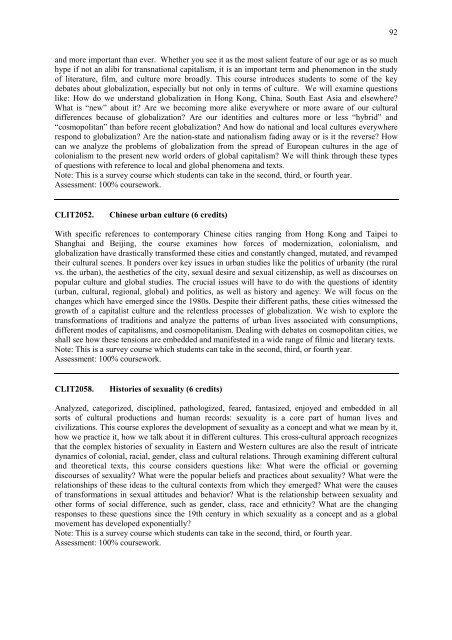(BA) (4-year-programme) - The University of Hong Kong
(BA) (4-year-programme) - The University of Hong Kong
(BA) (4-year-programme) - The University of Hong Kong
Create successful ePaper yourself
Turn your PDF publications into a flip-book with our unique Google optimized e-Paper software.
92and more important than ever. Whether you see it as the most salient feature <strong>of</strong> our age or as so muchhype if not an alibi for transnational capitalism, it is an important term and phenomenon in the study<strong>of</strong> literature, film, and culture more broadly. This course introduces students to some <strong>of</strong> the keydebates about globalization, especially but not only in terms <strong>of</strong> culture. We will examine questionslike: How do we understand globalization in <strong>Hong</strong> <strong>Kong</strong>, China, South East Asia and elsewhere?What is “new” about it? Are we becoming more alike everywhere or more aware <strong>of</strong> our culturaldifferences because <strong>of</strong> globalization? Are our identities and cultures more or less “hybrid” and“cosmopolitan” than before recent globalization? And how do national and local cultures everywhererespond to globalization? Are the nation-state and nationalism fading away or is it the reverse? Howcan we analyze the problems <strong>of</strong> globalization from the spread <strong>of</strong> European cultures in the age <strong>of</strong>colonialism to the present new world orders <strong>of</strong> global capitalism? We will think through these types<strong>of</strong> questions with reference to local and global phenomena and texts.Note: This is a survey course which students can take in the second, third, or fourth <strong>year</strong>.Assessment: 100% coursework.CLIT2052.Chinese urban culture (6 credits)With specific references to contemporary Chinese cities ranging from <strong>Hong</strong> <strong>Kong</strong> and Taipei toShanghai and Beijing, the course examines how forces <strong>of</strong> modernization, colonialism, andglobalization have drastically transformed these cities and constantly changed, mutated, and revampedtheir cultural scenes. It ponders over key issues in urban studies like the politics <strong>of</strong> urbanity (the ruralvs. the urban), the aesthetics <strong>of</strong> the city, sexual desire and sexual citizenship, as well as discourses onpopular culture and global studies. <strong>The</strong> crucial issues will have to do with the questions <strong>of</strong> identity(urban, cultural, regional, global) and politics, as well as history and agency. We will focus on thechanges which have emerged since the 1980s. Despite their different paths, these cities witnessed thegrowth <strong>of</strong> a capitalist culture and the relentless processes <strong>of</strong> globalization. We wish to explore thetransformations <strong>of</strong> traditions and analyze the patterns <strong>of</strong> urban lives associated with consumptions,different modes <strong>of</strong> capitalisms, and cosmopolitanism. Dealing with debates on cosmopolitan cities, weshall see how these tensions are embedded and manifested in a wide range <strong>of</strong> filmic and literary texts.Note: This is a survey course which students can take in the second, third, or fourth <strong>year</strong>.Assessment: 100% coursework.CLIT2058.Histories <strong>of</strong> sexuality (6 credits)Analyzed, categorized, disciplined, pathologized, feared, fantasized, enjoyed and embedded in allsorts <strong>of</strong> cultural productions and human records: sexuality is a core part <strong>of</strong> human lives andcivilizations. This course explores the development <strong>of</strong> sexuality as a concept and what we mean by it,how we practice it, how we talk about it in different cultures. This cross-cultural approach recognizesthat the complex histories <strong>of</strong> sexuality in Eastern and Western cultures are also the result <strong>of</strong> intricatedynamics <strong>of</strong> colonial, racial, gender, class and cultural relations. Through examining different culturaland theoretical texts, this course considers questions like: What were the <strong>of</strong>ficial or governingdiscourses <strong>of</strong> sexuality? What were the popular beliefs and practices about sexuality? What were therelationships <strong>of</strong> these ideas to the cultural contexts from which they emerged? What were the causes<strong>of</strong> transformations in sexual attitudes and behavior? What is the relationship between sexuality andother forms <strong>of</strong> social difference, such as gender, class, race and ethnicity? What are the changingresponses to these questions since the 19th century in which sexuality as a concept and as a globalmovement has developed exponentially?Note: This is a survey course which students can take in the second, third, or fourth <strong>year</strong>.Assessment: 100% coursework.
















